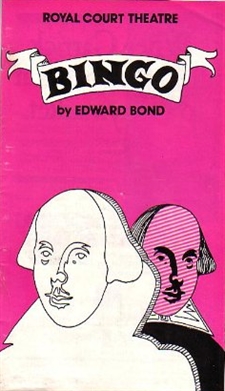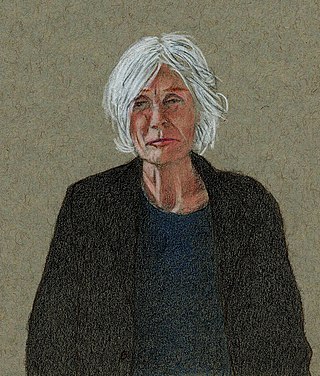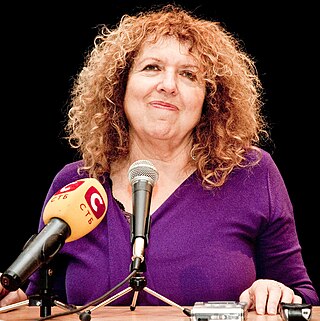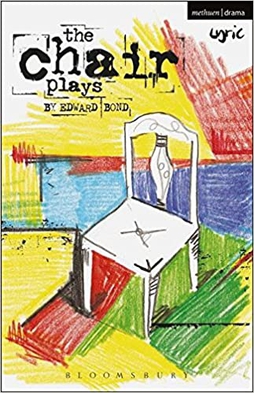Related Research Articles

Top Girls is a 1982 play by Caryl Churchill. It centres on Marlene, a career-driven woman who is heavily invested in women's success in business. The play examines the roles available to women in old society, and what it means or takes for a woman to succeed. It also dwells heavily on the cost of ambition and the influence of Thatcherite politics on feminism.
A Number is a 2002 English play by Caryl Churchill. The story, set in the near future, is structured around the conflict between a father (Salter) and his sons – two of whom are clones of the first one. The play addresses the subject of human cloning and identity, especially nature versus nurture. Many critics over the years have lauded A Number, arguing Churchill created a work of significant intellectual depth with effective economy of style.
Far Away is a 2000 play by British playwright Caryl Churchill. It has four characters, Harper, Young Joan, Joan, and Todd, and is based on the premise of a world in which everything in nature is at war. It is published by Nick Hern Books. While some critics have expressed reservations about the play's ending, many regard Far Away as one of Churchill's finest plays.
Amelda Brown is a British actress of stage, film, and television. She trained at the Royal Academy of Dramatic Art, graduating in 1980, and became known for her work in fringe theatre.
Drunk Enough to Say I Love You? is a 2006 political play with eight scenes by Caryl Churchill. It addresses the application of power by the United States mostly since the Vietnam war. Critics' responses to the play are divided.

Bingo: Scenes of Money and Death is a 1973 play by English playwright Edward Bond. It depicts an ageing William Shakespeare at his Warwickshire home in 1615 and 1616, suffering pangs of conscience in part because he signed a contract which protected his landholdings, on the condition that he would not interfere with an enclosure of common lands that would hurt the local peasant farmers. Although the play is fictional, this contract has a factual basis. Bingo is a political drama heavily influenced by Bertolt Brecht and Epic theatre. Some have praised Bond's portrayal of Shakespeare while others have criticized it.
Blue Heart was written by Caryl Churchill and copyrighted in 1997. The play is two one act plays. The first play, Heart’s Desire, is about a family waiting on the arrival of their daughter Suzy. The second play Blue Kettle, is about a man named Derek who goes around telling women they're his mother because he was adopted at birth. The women believe him and truly find ways to tell him the way he is their son. Blue Heart is highly regarded by critics.
Seven Jewish Children: A Play for Gaza is a six-page, 10-minute play by British playwright Caryl Churchill, written in response to the 2008-2009 Israel military strike on Gaza, and first performed at London's Royal Court Theatre on 6 February 2009. Churchill, a patron of the Palestine Solidarity Campaign, has said that anyone wishing to produce it may do so gratis, so long as they hold a collection for the people of Gaza at the end.

Caryl Lesley Churchill is a British playwright known for dramatising the abuses of power, for her use of non-naturalistic techniques, and for her exploration of sexual politics and feminist themes. Celebrated for works such as Cloud 9 (1979), Top Girls (1982), Serious Money (1987), Blue Heart (1997), Far Away (2000), and A Number (2002), she has been described as "one of Britain's greatest poets and innovators for the contemporary stage". In a 2011 dramatists' poll by The Village Voice, five out of the 20 polled writers listed Churchill as the greatest living playwright.
Love and Information is a play written by the British playwright Caryl Churchill. It first opened at the Royal Court Theatre in September 2012. It received many positive reviews from critics.
Michael Buffong is an English theatre director and the Artistic Director of Talawa Theatre Company. His work is characterised by reworking stage classics delivered to high degree of detail. Buffong has been described as "one of the most influential directors of classic plays over the last two decades", in addition to being named one of Creative Review's 50 Creative Leaders. In Spring 2019, Buffong was one of the judges of the Susan Smith Blackburn Prize.
Light Shining in Buckinghamshire is a play by British playwright Caryl Churchill written in 1976.
Alice Birch is a British playwright and screenwriter. Birch has written several plays, including Revolt. She Said. Revolt Again. for which she was awarded the George Devine Award for Most Promising New Playwright, and Anatomy of a Suicide for which she won the Susan Smith Blackburn Prize. Birch was also the screenwriter for the film Lady Macbeth and has written for such television shows as Succession, Normal People, and Dead Ringers.
Fen is a 1983 play by Caryl Churchill. While not as well known as Churchill works like Cloud 9 (1979) and Top Girls (1982), it has been praised by many critics.
Escaped Alone is a 2016 play by Caryl Churchill. Critics' reviews were mostly positive.
Glass. Kill. Bluebeard. Imp. is a 2019 series of plays by British playwright Caryl Churchill that were premiered together.

Elyse Dodgson MBE was an English theatre producer. In 1996 she co-founded the International Department at the Royal Court Theatre and ran this for over 20 years. In this time she worked with playwrights and coordinated play development projects in more than 70 countries. According to April De Angelis, Dodgson was "responsible for thousands of new plays written in voices that may otherwise have remained silent."

The Chair Plays are a trilogy of plays by English dramatist Edward Bond. The trilogy includes Have I None, The Under Room, and Chair. Have I None was premiered by Big Brum on 2 November 2000 at Birmingham's Castle Vale Artsite. The Under Room was also premiered by Big Brum at MAC in October 2005. Chair was written specially for radio, and while it was written in 2000, its first staged production was in Lisbon, at the Teatro da Cornucópia in June 2005. The London premiere of the entire trilogy was at Lyric Hammersmith, on 19 April 2012. Have I None and Chair received mostly positive reviews, but The Under Room polarized critics.
Ashley McGuire is a British actress, known for her roles as Big Mandy in the BBC comedy series This Country and Vicky Houghton in the BBC One series This Is Going to Hurt.
[BLANK] is a 2019 play by Alice Birch. The play consists of 100 unrelated scenes from which a director may pick and choose. It's 2019 premiere at the Donmar Warehouse in London was in celebration of the fortieth anniversary of Clean Break.
References
- ↑ McKie, Lettie (28 November 2015). "Review: Caryl Churchill's New Play About The End Of Life". Londonist. Retrieved 4 June 2020.
- ↑ Trueman, Matt (30 November 2015). "London Theater Review: Caryl Churchill's 'Here We Go'". Variety. Retrieved 4 June 2020.
- ↑ Lawson, Mark (10 December 2015). "Caryl Churchill's Here We Go: Eight actors in search of an ending". New Statesman. Retrieved 5 June 2020.
- ↑ Billington, Michael (29 November 2015). "Here We Go review – Caryl Churchill's chilling reminder of our mortality". The Guardian. ISSN 0261-3077 . Retrieved 4 June 2020.
- ↑ Healey, Verity (29 November 2015). "Here We Go". Exeunt Magazine. Retrieved 4 June 2020.
- ↑ Hewitt, Chris (26 September 2019). "Onstage spotlight: "Excaped Alone/Here We Go" ends at Gremlin Theatre". Star Tribune. Retrieved 4 June 2020.
- ↑ Preston, Rohan (11 September 2019). "What's it like to die? Frank Theatre stages two Caryl Churchill one-acts". Star Tribune. Retrieved 4 June 2020.